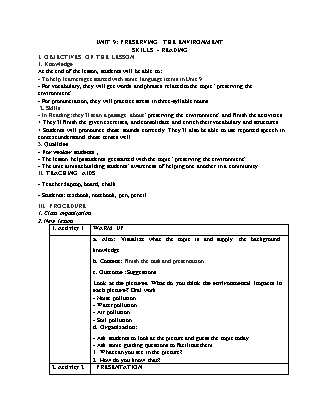Giáo án Tiếng Anh Lớp 10 (Thí điểm) - Unit 9: Preserving the environment - Lesson 3: Reading

I. OBJECTIVES OF THE LESSON
1. Knowledge
At the end of the lesson, students will be able to:
- To help learners get started with some language items in Unit 9.
- For vocabulary, they will get words and phrases related to the topic “preserving the environment”
- For pronunciation, they will practice stress in three-syllable nouns
2. Skills
- In Reading: they’ll scan a passage about “preserving the environment” and finish the activities.
+ They’ll finish the given exercises, and consolidate and enrich their vocabulary and structures
+ Students will pronounce those sounds correctly. They’ll also be able to use reported speech in context understand those tenses well.
3. Qualities
- For weaker students,
- The lesson helps students get started with the topic “preserving the environment”.
- The unit aims at building students’ awareness of helping one another in a community.
II. TEACHING AIDS
- Teacher: laptop, board, chalk
- Students: textbook, notebook, pen, pencil
UNIT 9: PRESERVING THE ENVIRONMENT SKILLS - READING I. OBJECTIVES OF THE LESSON 1. Knowledge At the end of the lesson, students will be able to: - To help learners get started with some language items in Unit 9. - For vocabulary, they will get words and phrases related to the topic “preserving the environment” - For pronunciation, they will practice stress in three-syllable nouns 2. Skills - In Reading: they’ll scan a passage about “preserving the environment” and finish the activities. + They’ll finish the given exercises, and consolidate and enrich their vocabulary and structures + Students will pronounce those sounds correctly. They’ll also be able to use reported speech in context understand those tenses well. 3. Qualities - For weaker students, - The lesson helps students get started with the topic “preserving the environment”. - The unit aims at building students’ awareness of helping one another in a community. II. TEACHING AIDS - Teacher: laptop, board, chalk - Students: textbook, notebook, pen, pencil III. PROCEDURE 1. Class organization 2. New lesson 1. Activity 1 WARM UP a. Aim: Visualize what the topic is and supply the background knowledge b. Content: finish the task and presentation c. Outcome: Suggestions Look at the pictures. What do you think the environmental impacts in each picture? Oral work - Noise pollution. - Water pollution. - Air pollution. - Soil pollution. d. Organization: - Ask students to look at the picture and guess the topic today. - Ask some guiding questions to facilitate them 1. What can you see in the picture? 2. How do you know that? 2. Activity 2 PRESENTATION a. Aim: elicit new words, supply structures and grammatical knowledge b. Content: finish the task and presentation c. Outcome: Expected answers Environmental pollution * Vocabulary. - vegetation(n): - pesticide - ecosystem - pollutant - fertilizer - inorganic - organic Individual work d. Organization - Ask them if they have any new words. - Supply them with the words they asked. - Read and understand the text. 3. Activity 3 PRACTICE a. Aim: practice skills b. Content: finish the task and presentation c. Outcome: Suggested answer: Match the highlighted word in the text with the correct definition below. 1. ecosystem 2. pesticides 3. inorganic 4. vegetation 5. fertilizer 6. pollutants Activity 4. Read the text and answer the questions. Pair work 1. F natural disasters: human activities 2. F: water pollution: air pollution 3. T 4. T 5. T 6. T d. Organization: - Divide class into 3 groups, let students play quick game before doing the matching exercises. - Each group will say “ting ting” to have chance to answer. The team says “ting ting” first and answer correctly will get one point. - After that, students work in pair to finish True, False exercise. Teacher check their answers 4. Activity 5 APPLICATION a. Aim: use languages to practice in pairs/groups b. Content: finish the task and presentation c. Outcome: Suggested answer: Discuss the types of pollution in your neighborhood and their consequences. Group work - Types of pollution - Causes - Consequences d. Organization: - Tell students to compare their answers with others. Let them discuss and correct for one another. - Call on some students to read their answers aloud in front of the class. - Finally, give correct answers and explain all the sentences carefully to make sure students understand the meaning of the sentences. - Summarize the main points. - Supply them with the new words. - Ask students to learn the new words in the text. - Tell them to prepare for the next period. IV. Consolidation (1 min) - Vocabulary related to preserving the environment V. Homework: (1 min) - Vocabulary related to preserving the environment - Do the task again - Read Unit 9 - Speaking at home
Tài liệu đính kèm:
 giao_an_tieng_anh_lop_10_thi_diem_unit_9_preserving_the_envi.docx
giao_an_tieng_anh_lop_10_thi_diem_unit_9_preserving_the_envi.docx



